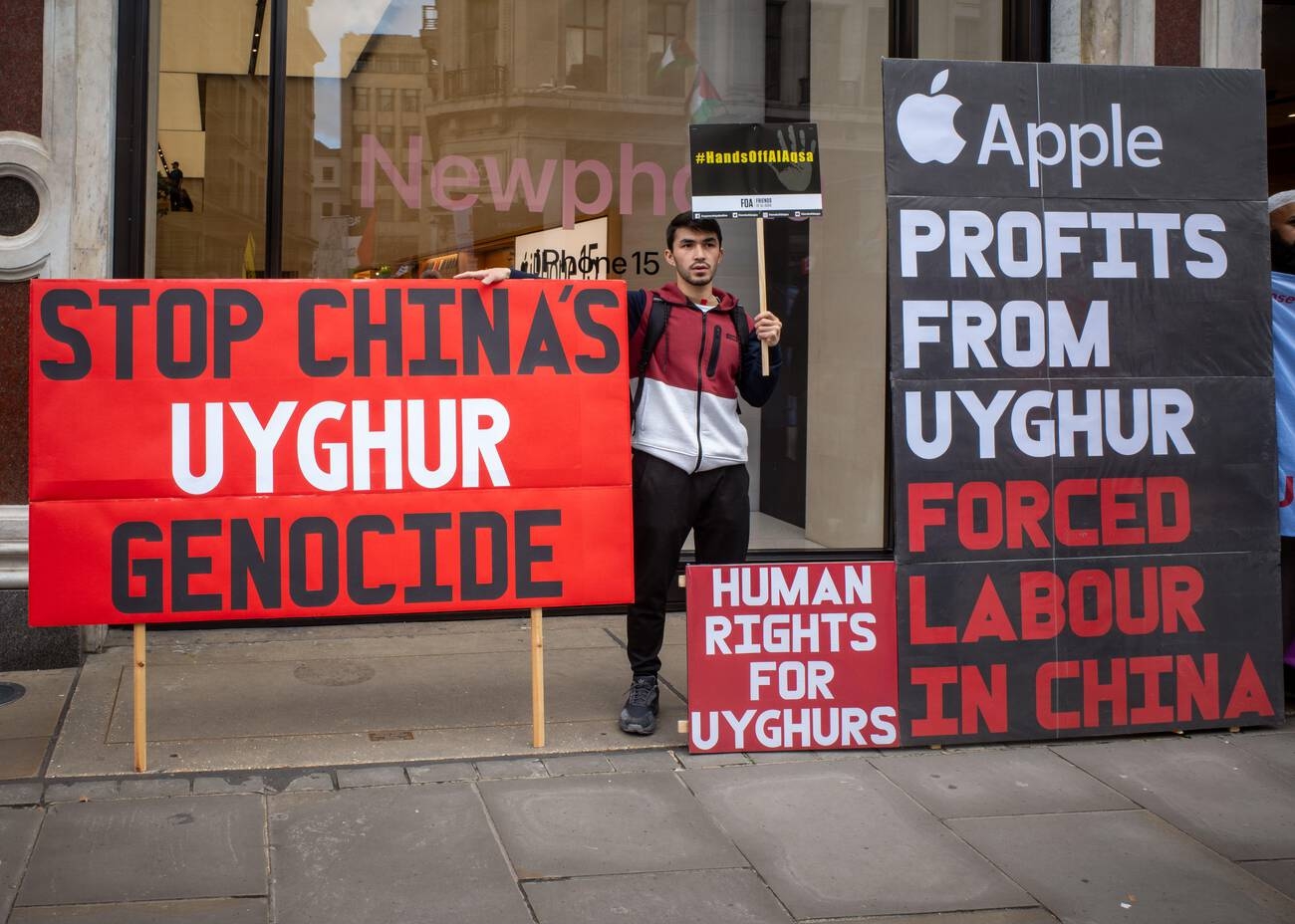Human Lives Human Rights: In the first few years of the conflict, the Sudanese government regularly described the situation in Darfur as “tribal clashes” and consistently refused to acknowledge its responsibility for systematic attacks on civilians.
Khartoum has accused international journalists and human rights groups of “fabricating” the Darfur situation, despite the overwhelming evidence of the Sudanese government’s responsibility for the crimes.
The government has tried to limit media access to Darfur and has consistently harassed journalists and restricted press freedom in an effort to stop the information flow from Darfur.
In 2004 the government detained the Al Jazeera correspondent in Khartoum for several weeks after the news agency transmitted reports about Darfur and in August 2006, several western journalists were arrested in Darfur and turned over to Sudanese intelligence.
Although these individuals were later released, in September 2006 the Sudanese government began cracking down on Sudanese media through pre-print censorship and arbitrary arrests, and imposing many bureaucratic restrictions on international journalists.
Khartoum continues to massively understate the crisis in Darfur, maintaining that only 9,000 people have been killed in the five years of conflict.
What is the UN Security Council doing about Darfur?
Despite passing more than a dozen resolutions over a period of four years demanding that the Sudanese government take certain steps, including disarming its militias and ceasing attacks on civilians, there has been little united effort by the UN Security Council to ensure that these demands are met.
The main reason is that the UN Security Council is divided on Sudan because different member states have divergent interests. Russia and China have often supported the Sudanese government because of ideological commitments (non-interference in internal affairs of member states) and both have economic interests in Sudan. China, for instance, imports between 4-7 percent of its oil from Sudan and the Sudan oil project is its most successful international oil development endeavor.
The most recent action taken by the Security Council was its approval of the UN-AU “hybrid” peacekeeping force in July 2007. Two other important steps taken by the Council were the referral of the situation in Darfur to the International Criminal Court (ICC) in The Hague because of crimes against humanity and war crimes in Darfur, and the establishment of a sanctions committee and a panel of experts to investigate individuals who violate the arms embargo, commit abuses of human rights, or impede the peace process. They have to-date only imposed sanctions on four individuals, none of them senior government officials.
What kind of sanctions has the United Nations imposed on the parties in the Darfur conflict?
In December 2005 the UN panel of experts recommended that 17 people, including the Sudanese Minister of Defense, Major-General Abdel Rahim Mohammed Hussein, nine other government officials, two Janjaweed militia leaders and five Darfur rebel commanders, be sanctioned for their role in committing human rights violations and impeding the peace process.
In April 2006 the UN Security Council voted for targeted sanctions on four Sudanese individuals: a former Sudanese military commander, a Janjaweed militia leader and two rebel commanders. These sanctions include travel bans and freezing foreign bank accounts and other assets. No active duty or serving Sudanese officials have been placed on the sanctions list.
Since the imposition of targeted sanctions against these four fairly low-level individuals a year ago, the UN Sanctions Committee has failed to sanction further individuals due to objections by China, Russia and Qatar.
In September 2007 the Panel of Experts submitted a new report to the UN sanctions committee that described breaches of international humanitarian law and human rights and blatant violations of the arms embargo by all the warring parties.
They also reported the Sudanese government’s unlawful use of “UN”-marked planes for military operations and breach of the ban on offensive military overflights, as well as their failure to implement existing sanctions.
The Panel’s October 2006 report included another confidential annex of additional names of individuals recommended for targeted sanctions, and the September 2007 report included a public list of names.
However, as of April 2008, there has been no action by the UN Security Council to extend sanctions to any of the senior figures responsible for past or recent attacks on civilians.
What is the International Criminal Court doing about Darfur?
The International Criminal Court (ICC) opened an investigation into the situation in Darfur in June 2005. The ICC has the mandate to investigate those individuals most responsible for crimes against humanity, war crimes, genocide and other crimes committed since July 2002 in accordance with the Rome Statute. On April 27, 2007, the ICC’s Pre-Trial Chamber issued arrest warrants for Sudan’s state minister for humanitarian affairs Ahmed Haroun and the Janjaweed militia leader Ali Kosheib for a series of attacks in West Darfur in 2003 and 2004. The Sudanese government has publicly indicated it will not cooperate with the ICC and insists that it will try criminals in Darfur itself. Instead of fulfilling its obligations to hand Ahmed Haroun over to the court, Haroun remains State Minister for Humanitarian Affairs in Darfur, and in September 2007 the government appointed Haroun to co-chair a committee mandated to investigate human rights abuses. The second suspect, Kosheib, was reportedly released from Sudanese jail in October 2007, where he had been held on other charges.
In April 2008, Sudan’s UN ambassador Abdel-Mahmood Mohamad, far from cooperating with the court he called for the ICC’s chief prosecutor, Luis Moreno Ocampo, to be brought before a court for impeding the peace process in Sudan.
What is the Sudanese government doing to prosecute war crimes?
There is no indication that the Sudanese justice system is seriously investigating or prosecuting any of the government officials, militia leaders or other individuals responsible for serious crimes in Darfur. It established the Special Criminal Court on the Events in Darfur in 2005 but has convicted very few persons and no leaders. For more information on the Special Criminal Court, please see the Human Rights Watch report, “Lack of Conviction: The Special Criminal Court on the Events in Darfur.”
What are the religious dimensions of the conflict in Darfur?
All of the people in Darfur are Muslim. The Sudanese government and its Janjaweed militias are also Muslim. There have been many incidents, however, of government forces and Janjaweed destroying mosques, looting the contents of mosques, killing imams and others seeking refuge inside mosques and desecrating the Koran while attacking civilian villages. For example, in just one small area of West Darfur, Human Rights Watch documented the destruction of least 62 mosques by Sudanese government forces and militia during attacks in late 2003 and early 2004.
What are the ethnic divisions in Darfur?
There are many different ethnic groups in Darfur with their own languages and customs. The rebel movements are drawn from three main ethnic groups: the Fur, Zaghawa and Masalit, all of which are considered non-Arab. The Janjaweed militias recruited, armed and trained by the Sudanese government are mainly drawn from several small Arab nomadic tribes who historically have no access to land, many of whom migrated into Darfur from Chad as a result of civil wars in Chad in the 1960s-1980s. Historically these groups coexisted peacefully and settled disputes through mediation of their leaders or the colonial government, with payment of damages for casualties and property damaged or stolen. There was intermarriage between ethnic groups, despite clashes over resources. There are also many larger Arab communities in Darfur who have their own homelands or dars, and have not participated in the conflict, so it is an oversimplification to describe Darfur as an African-Arab conflict.
How are people surviving in Darfur?
Nearly 2.5 million people—more than one third of the population—are now living in displaced persons camps where they are almost entirely dependent on international humanitarian assistance.
In many areas they cannot go far from the camps because they continue to be attacked by the militias and women are frequently raped and assaulted when they try to collect firewood or go to market. People cannot return to their homes due to the continuing presence of government-backed militias in the rural areas. Because of the war-caused widespread displacement of subsistence farmers and disruption of trade and nomadic migration routes, the economy of Darfur has been severely disrupted.
An additional 2 million people, not displaced, are considered “conflict affected” and many are in need of humanitarian assistance. More than 4 million people in Darfur depend on humanitarian aid in some form.
Hundreds of thousands of people in need are beyond the reach of aid workers due to insecurity and targeted attacks as well as interference from obstructive government officials, both civilian and military.
Why would the Sudanese government organize the Janjaweed militias?
Many of the members of the Sudanese armed forces are from Darfur, so the government may have been reluctant to use those troops in a conflict in their own region.
In addition, the government of Sudan has often used ethnic militias as proxy forces, including in southern Sudan and the Nuba Mountains. The use of militias provides the government with “deniability;” it claims that it cannot “control” the militias.
There is no evidence, however, that it has actually attempted to do so and there is considerable evidence that militias continue to be paid, armed, organized and directed by army military intelligence and other officers, with assistance from civilian state and national officials.
The militias allow the Sudanese government to have a large but inexpensive armed force at its disposal that will serve loyally as a counterinsurgency force, as the militias stand to benefit financially (loot and land) from their participation in the fighting.
Who is backing the Sudanese government?
The Sudanese government buys and receives military supplies from several countries, including China, Russia, Belarus, Ukraine and others.
Sudan’s government revenues have increased substantially since it began exporting oil in August 1999; government revenue is now estimated to have tripled from 1999 to 2004 and its oil revenue is estimated to be US$3 billion a year.
As a result, Sudan has been able to purchase additional attack helicopters, MiG planes, artillery and other war materiel.
At the end of the 21-year war in the south of Sudan, after a ceasefire was reached in October 2002, the government of Sudan was also able to shift many of its recently acquired arms to Darfur for use in counter-insurgency operations.
The Sudanese government, throughout the war in southern Sudan and now Darfur, has received high levels of international humanitarian assistance. The World Food Program, for instance, is providing assistance for 6 million people in Sudan, including in Darfur and the south.


















